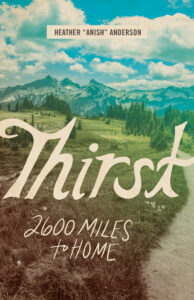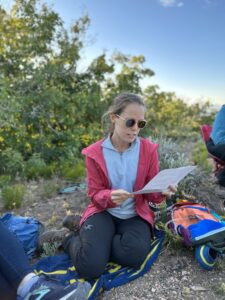 For our June 2023 book club hike, we discussed Heather “Anish” Anderson’s book Thirst: 2600 Miles from Home.
For our June 2023 book club hike, we discussed Heather “Anish” Anderson’s book Thirst: 2600 Miles from Home.
Thirst is a gripping memoir that chronicles Anderson’s incredible journey as an ultralight hiker attempting to set the fastest known time (FKT) on the Pacific Crest Trail (PCT). Anderson intimately shares her physical and emotional challenges, as well as the self-discovery she undergoes during her record-breaking hike. The book offers a window into the world of long-distance hiking, exploring themes of determination, resilience, and the deep connection between human spirit and nature. With raw honesty, Thirst paints a portrait of an extraordinary woman pushing the boundaries of endurance, offering readers an inspiring narrative of self-discovery and perseverance on the trail.
Here are the questions I prepared for our Thirst book club discussion on the Alien Tower hike in Draper, Utah.
Discussion Topic #1
Heather wrote on page 34,
I felt nauseous. Rest areas with fountains were spaced a mile and a half apart, but I still ran out of water.
My head pounded. A mule team approached—a string of animals carrying other overweight, sedentary folks like me down into the canyon. A voice in the back of my head chimed in over the sound of hooves clanking down the trail:
People like you don’t hike, Heather. They ride. In cars, on mules, in airplanes.
I leaned against the striated walls to let them pass and prayed not to die.
I lost all sense of time as we hiked upward. My world was a spinning kaleidoscope of sky and swirling, colored rock layers, with my roommate at the center of my vision. Steadily, I inched upward through time.
Finally, we crested the rim of the canyon.
Describe a time you thought, People like me don’t do X. How did that influence you in doing X? How did you feel when you finally did X?
Discussion Topic #2
When her gym teacher asks the class to list their goals, Heather realizes she doesn’t have any. She writes on page 28,
I tried to doing anything athletic. Instead, all I could think of were my failures. My father walking away from me, shaking his head and throwing his hands in the air. . . . But, I needed to write something. I let my imagination run wild. I was never going to achieve anything athletic, but I could write anything.
So, she writes this:
If I ever manage to overcome my athletic weaknesses, I want to set a record. Not just any record, but an athletic record. One that everyone will know me for. One that my dad will be proud of. I don’t know what it will be, but I will do it. I have a lot of weaknesses, but I have two critical strengths. I am stubborn and I am smart. I will find a way to be good at something athletic. I will lose weight. I’ll get faster and stronger. Maybe I’ll even go to the Olympics. Whatever it takes to achieve my goal.
What is something you didn’t think you were capable of or that you thought you were bad at? Or what do you still think you aren’t capable of or are still bad at? Did this make you more or less motivated to overcome it? How does reading Heather’s story make you feel about overcoming your perceived weakness?
Discussion Topic #3
How did Heather’s goal to overcome her perceived weakness impact her during the pursuit of her attempt for the FKT?
Discussion Topic #4
How did Heather’s perceived weakness impact her after she completed her goal?
Discussion Topic #5
Heather writes on page 48,
I didn’t know if I had what it took. In fact, I seriously doubted it. But, I was unwilling to give up without a fight. After all, I’d quit my job, sold most of my belongings, and bought a one-way plane ticket—my last ditch effort to regain happiness and a purpose in life.
Does Heather find happiness?
Discussion Topic #6
Continued from that same passage . . .
If it doesn’t work. . . ? I supposed I’d throw my past—my identity and my memories—of a cliff and walk away with nothing. Walk away to become someone else—somewhere else—and never look back, never hike again.
What do you think would have happened if Heather hadn’t succeeded?
Discussion Topic #7
 Heather writes on page 48,
Heather writes on page 48,
On the trail I didn’t feel excitement either, only impetus. The few people I had met gave me effusive praise for attempting the seemingly crazy endeavor. I received it with a mix of emotions, drawing courage and strength as well as resentment from their words. People believe I can do this! Maybe they are right! Yet, I feel like a sacrifice to vicariousness. If people were this eager to see someone break this record, then why didn’t someone already do it? Why me?
It’s interesting how Heather felt resentment that people were eager to see her do break the record for the FKT yet they weren’t willing to try themselves, as though she had to be the sacrificial lamb. As though the record had to be broken. Why did Heather feel this way?
Discussion Topic #8
What was the real reason that Heather was attempting the FKT on the PCT?
Discussion Topic #9
Throughout the book, Heather talks about how she is constantly dehydrated and peeing orange. In fact, she almost gives up because of dehydration:
“I might die of thirst out here,” I said to the orange SPOT in my hand.
Tears rolled down my face. The moment of quitting I’d imagined on my first day hadn’t been like this. It hadn’t involved me sitting in the desert sun, dehydrated and dizzy, three miles down trail from the nearest water. I’d imagined simply being too tired or incapable of continuing. I had imagined being in control of my journey, even the end. . . .
“Get up. You haven’t been through everything you’ve been through to quit because you’re thirsty. It’s three miles. Three fucking miles.”
Heather names the book Thirst. What does the title of the book really refer to?
Discussion Topic #10
Heather says on her Facebook page,
The hardest thing about writing this book wasn’t getting words out of my head and onto the paper.
It wasn’t being open and vulnerable for the world to read.
It wasn’t the editing process.
It was putting myself back into the stinky, dirty shoes of this woman.
Why do you think it was hard for her to put herself “back into the stinky, dirty shoes of this woman”?
Discussion Topic #11
What lessons can we learn from Heather’s experience setting the FKT on the PCT?
Discussion Topic #12
In an interview with Outside magazine, Heather said,
The trail is for you, whatever you need it to be, when you need it. If you spend time hiking and really immersing yourself in nature, what you’re doing is immersing yourself in yourself. You’re learning about yourself and communicating with yourself.
What have you learned about yourself through hiking?
Discussion Topic #13
In the same vein as Cheryl Strayed’s Wild, the PCT provides the setting for a tortured soul seeking to find themselves and wrestle with their inner demons. The physical portion of their two journeys share many parallels: water shortages, freak storms, wildlife encounters, malfunctioning gear and even a creepy encounter in the Northwest.
For those who have read both, how does Heather’s journey different Cheryl’s?
Discussion Topic #14
Heather said in a recent Facebook post,
Early June—ten years ago—I was standing in the desert, 50 miles from San Diego, terrified.
About to take the first steps of my first Fastest Known Time (FKT) attempt.
I didn’t know what I was getting myself into (and I’m sorta glad), nor did I know if what I was planning was even possible.
It’s not an exaggeration to say it was one of the scariest moments in my life.
But, I signed the register, put on my backpack, and walked to Canada on the PCT… faster than anyone else had ever done.
Taking the first step is often the hardest—and not just in hiking.
In life, many times, the fear of starting stops us. The fear of failing, the what ifs.
Overcoming fear—courage—is not whether we succeed in our attempt.
It’s the attempt itself.
It’s been 10 years since Heather achieved the FKT on the PCT. How has her perspective shifted?
What Thirst book club discussion topics would you add? Tell us in the comments.


